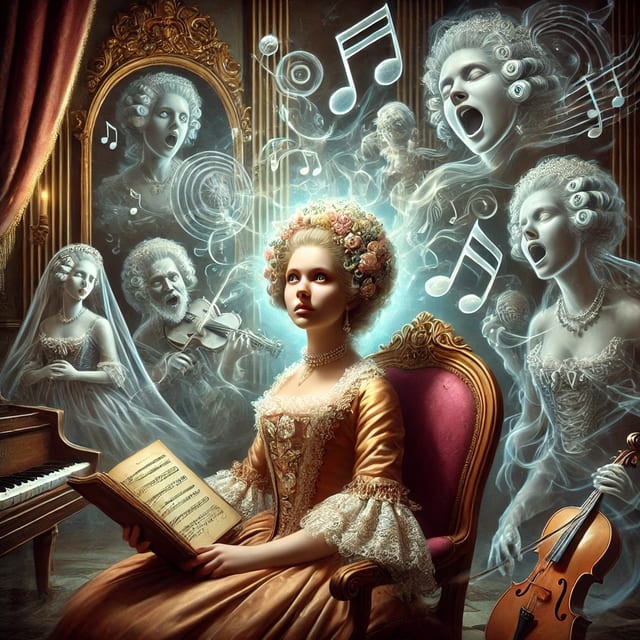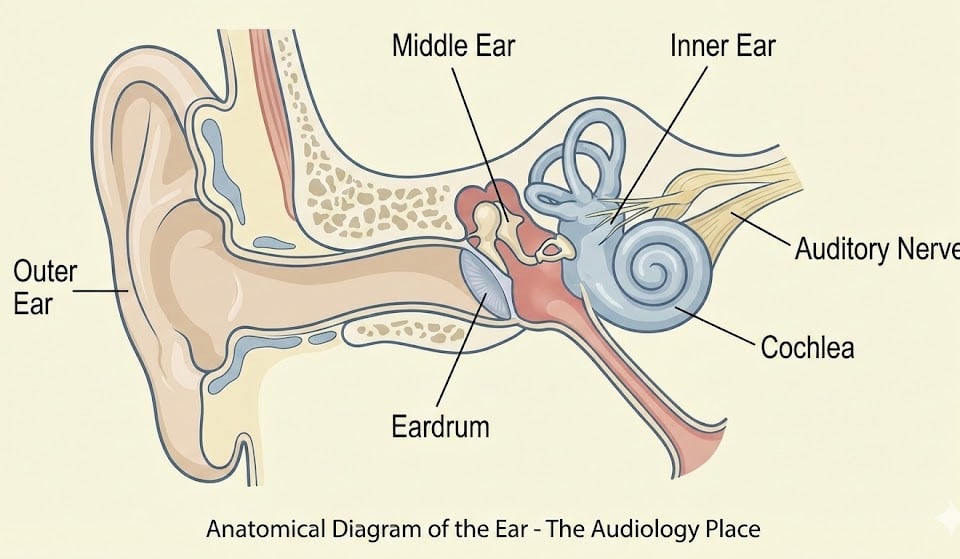Musical hallucinations (MH) are a fascinating and often unsettling phenomenon where individuals perceive music, melodies, or songs without any external auditory stimulus. Unlike simple auditory hallucinations such as tinnitus, which may present as ringing, buzzing, or hissing, musical hallucinations are complex auditory perceptions, often involving distinct melodies, lyrics, or even full compositions.
While musical hallucinations have been documented for centuries, their exact prevalence, causes, and treatment strategies remain areas of ongoing research. This article explores the origins of musical hallucinations, their potential causes, the role of hearing loss, and treatment options available for those experiencing this condition. One of Dr. Signe Steers’ favourite authors, Oliver Sacks, has a fantastic book on this very topic called Musicophilia.
A Brief History of Musical Hallucinations
The first mention of musical hallucinations in the scientific literature dates back to 1881, when Emmanuel Régis, a French psychiatrist, described cases of patients hearing non-existent music. However, it wasn’t until 1932 that a distinction was made between psychotic musical hallucinations (associated with psychiatric conditions) and organic musical hallucinations (linked to neurological or sensory disorders).
Since then, numerous case studies and small-scale research efforts have attempted to determine the prevalence of MH. Estimates suggest that approximately 0.16% of patients in general hospitals experience musical hallucinations, though the actual number could be higher due to underreporting or misdiagnosis.
Causes of Musical Hallucinations
Musical hallucinations can arise from multiple origins, making it a complex condition to diagnose and treat. The leading causes include:
1. Psychiatric Disorders
Musical hallucinations have been linked to mental health conditions, particularly:
- Schizophrenia – Patients may experience complex auditory hallucinations, including music.
- Depression and Anxiety Disorders – Some individuals with severe mood disorders report hearing music as part of their symptoms.
- Obsessive-Compulsive Disorder (OCD) – Patients may develop persistent or intrusive musical hallucinations.
2. Neurological Conditions
A variety of neurological disorders have been associated with musical hallucinations, including:
- Temporal Lobe Epilepsy – Seizure activity in the temporal lobe, which processes auditory signals, can trigger hallucinations.
- Parkinson’s Disease – Some patients with Parkinson’s report experiencing phantom sounds or music.
- Stroke and Brain Lesions – Damage to the brain, particularly in auditory-processing regions, may lead to musical hallucinations.
- Multiple Sclerosis (MS) – Some MS patients have reported episodes of musical hallucinations linked to demyelination in auditory pathways.
3. Hearing Loss and Auditory Charles Bonnet Syndrome
One of the most common, yet lesser-known, causes of musical hallucinations is hearing loss. This condition, known as auditory Charles Bonnet Syndrome (aCBS), occurs when the brain compensates for sensory deprivation by generating its own sounds.
- Patients with severe or profound hearing loss are particularly at risk.
- Musical hallucinations in these cases tend to involve familiar songs, often from childhood or significant life events.
- They may assume the sounds are coming from an external source, leading to confusion or distress.
4. Medication-Induced Musical Hallucinations
Certain medications can trigger musical hallucinations. These include:
- Antidepressants
- Anti-Parkinson drugs
- Opioids
- Ketamine and hallucinogens
- Benzodiazepines
- Alcohol withdrawal
In many cases, discontinuing or adjusting the medication can alleviate the hallucinations.
5. Other Causes
Other contributing factors include:
- Liver disease (as seen in hepatic transplant patients)
- Neurodegenerative conditions such as Lewy Body Dementia
- Sensory deprivation from social isolation
A Case Study: The Story of an 81-Year-Old Woman
A well-documented case involved an 81-year-old woman with a history of severe hearing loss, particularly in her right ear. She had been wearing a hearing aid in her left ear, which retained some auditory function.
One day, she began experiencing vivid musical hallucinations, hearing childhood songs from artists she had enjoyed in her youth. She initially assumed the music was coming from an external source, unaware that it was a product of her own brain.
Her family became concerned, fearing the onset of dementia. A general practitioner prescribed sertraline, an antidepressant, but her symptoms persisted.
Following neurological testing and audiometry, doctors diagnosed her with musical hallucinations due to sensory deprivation from hearing loss. She was treated with carbamazepine, which reduced the frequency of the hallucinations but did not eliminate them entirely. With the correct diagnosis and treatment, she was able to maintain her independence and avoid institutionalisation (see Kukstas, 2019 for the full story).
Understanding the Mechanism of Musical Hallucinations
Researchers believe that musical hallucinations occur due to hyperactivity in the brain’s auditory processing centers, particularly in the:
- Temporal lobe (processes sound)
- Auditory cortex (interprets sound)
- Limbic system (processes emotions related to sound)
When hearing loss or neurological dysfunction reduces auditory input, the brain compensates by filling in the gaps, generating sound where none exists. This is similar to phantom limb pain, where amputees feel sensations in missing limbs.
How Are Musical Hallucinations Diagnosed?
To diagnose musical hallucinations, doctors typically perform:
- A full audiological examination (to assess hearing loss)
- Neurological testing (MRI, EEG, or CT scans to rule out structural abnormalities)
- Mental health evaluation (to identify psychiatric conditions)
- Medication review (to identify potential drug-induced causes)
Treatment and Management of Musical Hallucinations
There is no one-size-fits-all treatment for musical hallucinations, but strategies include:
1. Treating the Underlying Cause
- Hearing Aids and Cochlear Implants – Amplifying external sound can reduce hallucinations caused by sensory deprivation.
- Adjusting Medications – If a drug is suspected, altering dosage or discontinuing it may help.
- Psychiatric Treatment – If linked to mental health disorders, therapy and medication may be beneficial.
2. Pharmacological Interventions
Some medications have been found to partially reduce symptoms, including:
- Carbamazepine (antiepileptic drug)
- Antipsychotics (for psychiatric cases)
- Serotonergic drugs (SSRIs, SNRIs in mood-related cases)
3. Cognitive and Behavioral Strategies
- Cognitive Behavioral Therapy (CBT) – Helps patients manage distress and cope with the hallucinations.
- Mindfulness and Relaxation Techniques – Can help reduce anxiety associated with musical hallucinations.
References
Coebergh, J., Lauw, R., Bots, R., Sommer, I., Blom, J. (2015). Musical hallucinations: review of treatment effects Front. Psychol. Volume 6. https://doi.org/10.3389/fpsyg.2015.00814
Golden, E., Josephs, K. (2015) Minds on replay: musical hallucinations and their relationship to neurological disease, Brain, Volume 138, Issue 12, Pages 3793–3802, https://doi.org/10.1093/brain/awv286
Kukstas, C. (2019). Auditory Charles Bonnet syndrome: case report. British Journal of General Practice; 69 (684): 362-363. DOI: https://doi.org/10.3399/bjgp19X704537
Kumar, S., Sedley, W., Barnes, G., Teki, S., Friston, K., Griffiths, T. (2014). A brain basis for musical hallucinations. Cortex, Volume 52, Pages 86-97. https://doi.org/10.1016/j.cortex.2013.12.002.
Perez, P., Garcia-Antelo, M., Rubio-Nazabal, E. (2017) “Doctor, I hear music”: A brief review about musical hallucinations. Open Neurol J;11:11–14. doi: 10.2174/1874205X01711010011
Sacks, O. (2008). Musicophilia: tales of music and the brain. Revised and expanded, first Vintage books edition. Vintage Books.




